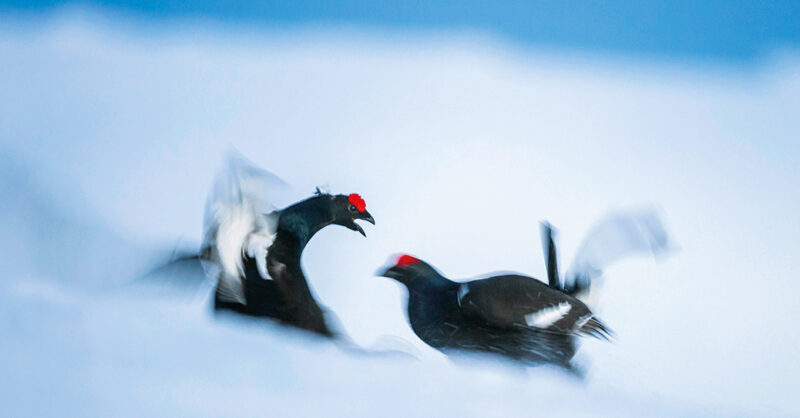
K3N2J5 black grouse on the snow, Trentino Alto-Adige, Italy
On a crisp morning, beneath the gentle light of dawn, the Pennine moors come alive with the vibrant dance of nature’s courtship. Among the dew-kissed grass, black grouse—known to some as blackcocks—engage in a mesmerizing spectacle known as a « lek, » an intricate display designed to captivate the discerning eyes of their female counterparts. These dawn performances are not merely a dance but an evolutionary sentence penned by the invisible hand of female selection.
The Dance of the Grouse
A lek is a gathering, an arena where male black grouse, decked in their most flamboyant adornments, vie for attention. Their tails fan out like delicate chrysanthemums, their combs burn bright red atop vigilant heads. To the casual observer, it’s an orchestrated chaos—a chorus of « koo-rooing, » rhythmic movements, and the occasional flurry of feathers as males spar among themselves. But underlying this avian theater is a narrative often overlooked: the powerful influence of female choice.
As the females, understated in their brown plumage, alight on the moor’s periphery, the frenzy reaches a crescendo. The males’ performances intensify, each striving to outshine the next. It’s not about dominance, as old teachings of natural selection might suggest, but about attraction, about being the chosen one in the eyes of a black hen.
The Power of Female Agency
This display isn’t merely an anecdote of nature; it’s a testament to a concept that has long simmered within evolutionary discussions: sexual selection, specifically female-driven selection. Darwin was among the first to ponder this natural phenomenon—how female preferences could sculpt the very forms and behaviors of species. Yet, it took decades, even centuries, for the scientific community to wholly embrace this idea, sidestepping biases and traditional views that marred interpretations of evolution.
Here, in the heart of the lek, female agency is undeniable. With each choice, with each step toward a chosen male, the black hen shapes the destiny of her kind. She is not merely a participant but a curator of genetic legacy—insisting on traits that may appear extravagant, even cumbersome, but serve an aesthetic and selective purpose.
The Ongoing Debate
The dialogue about sexual selection is far from quiet. The question echoes through scientific corridors: why do males risk survival with such ostentatious traits? Peacocks with their daunting tails and the gaudy hues of certain butterflies challenge the mere survival perspective. These features seem to defy practicality, steering instead towards what pleases the selective eye of the female.
The lek and its entranced observers prompt further inquiry. How does limitless choice carve the seemingly mundane into something spectacular yet seemingly impractical? It’s a « runaway » process, some argue—beauty begets beauty. And as one looks across species, from birds to insects, this ripple of selection is evident.
The Broader Implications
The ramifications of sexual selection extend beyond the world of birds and their winged courtship. They ripple into the realms of human evolution itself. Why do humans possess traits that, at first glance, appear devoid of survival value? Art, humor, intelligence—could these be echoes of ancient preferences, whispers from a past where mates sought partners as much for their minds as for their physical prowess?
The evolution of the human brain is often cited as a masterstroke of sexual selection. Why our ancestors opted for intelligence over brute strength remains a compelling narrative in human evolution. Perhaps, in those primal communities, wit and creativity became currencies of attraction, luring partners much like the flamboyant feathers of the grouse.
As one observes the intricate dance of the grouse, a reflection looms—our traits, desires, and societal constructs remain steeped in these ancient dances of choice. While nature’s lek might seem a world apart, a distant echo lives within each choice, each preference humanity makes, as much today as it did in the dawn of time.




